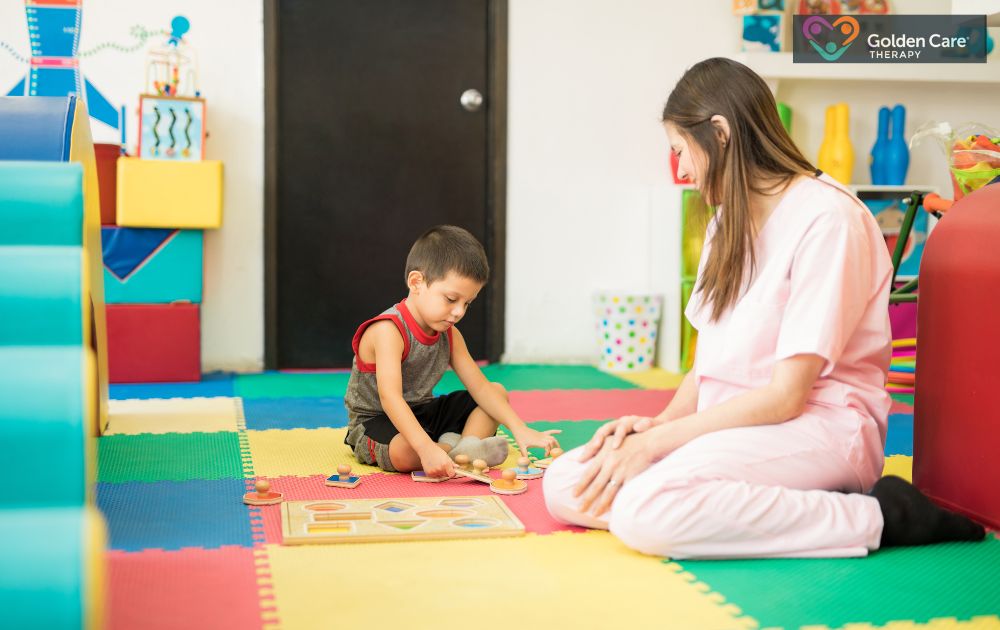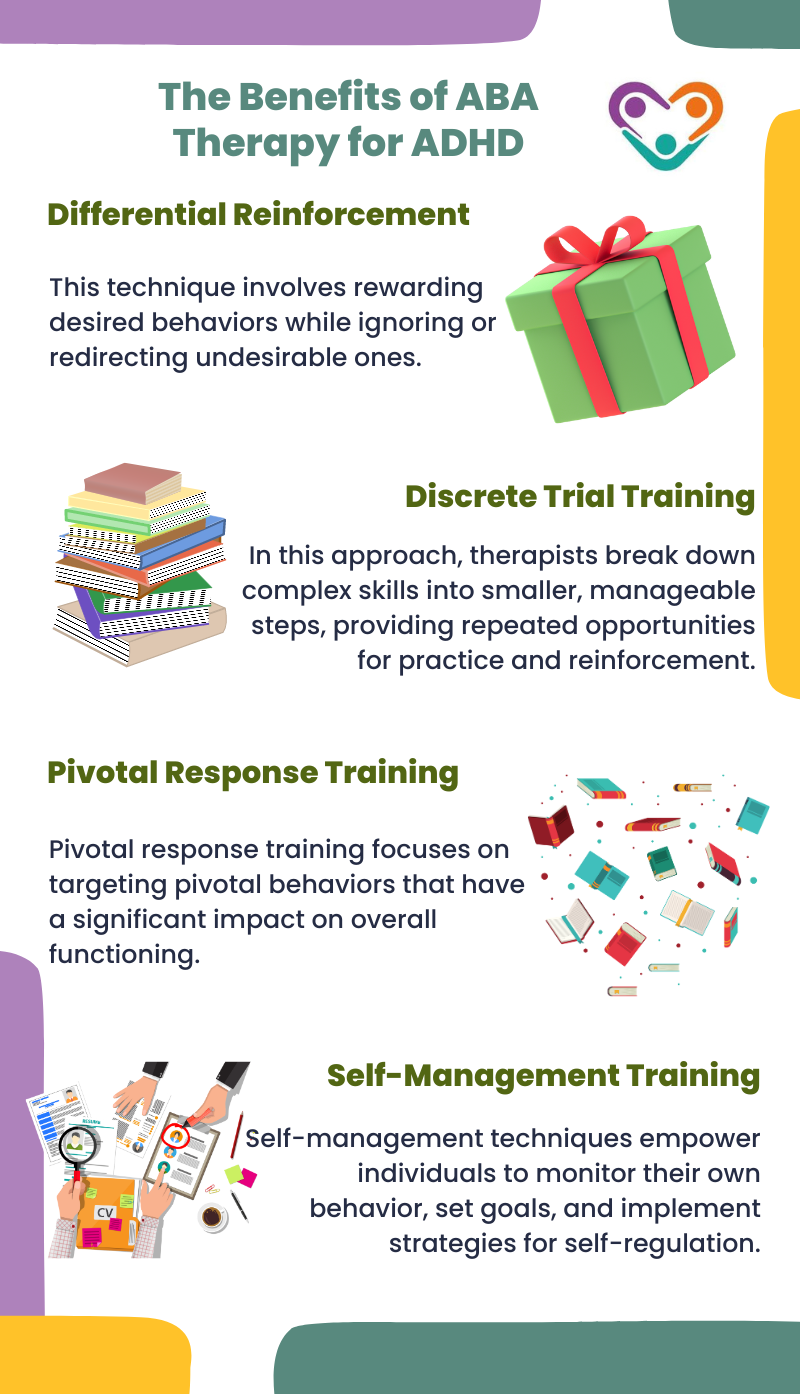As a parent or caregiver of a child with ADHD, you’re likely exploring various treatment options to help them thrive. Among these options, you may have come across Applied Behavior Analysis (ABA) therapy. But is ABA therapy good for ADHD? Let’s delve into this question and shed some light on how behavioral therapy can positively impact children and adults with ADHD.

How ABA Therapy Helps ADHD
ABA therapy has garnered recognition for its efficacy in addressing a wide range of behavioral issues, including those related to attention deficit hyperactivity disorder (ADHD). It offers significant benefits for individuals with ADHD, complementing traditional treatments and providing tailored interventions to address specific challenges associated with the disorder.

The Benefits of ABA Therapy for ADHD
By employing evidence-based techniques, ABA therapists help individuals with ADHD develop positive behaviors, improve focus and organization, and enhance impulse control. Moreover, through structured therapy sessions, individuals learn to inhibit impulsive actions, leading to better self-regulation and increased independence in daily tasks.
Several ABA techniques have shown promise in addressing ADHD symptoms effectively:
- Differential Reinforcement: This technique involves rewarding desired behaviors while ignoring or redirecting undesirable ones. By reinforcing positive actions, individuals with ADHD learn to engage in behaviors that are conducive to their success.
- Discrete Trial Training: In this approach, therapists break down complex skills into smaller, manageable steps, providing repeated opportunities for practice and reinforcement. This method helps individuals with ADHD master essential skills and reduces frustration associated with learning challenges.
- Pivotal Response Training: Pivotal response training focuses on targeting pivotal behaviors that have a significant impact on overall functioning. By addressing core deficits related to ADHD, such as social skills and communication, individuals experience improvements in various areas of their lives.
- Self-Management Training: Self-management techniques empower individuals to monitor their own behavior, set goals, and implement strategies for self-regulation. Through self-monitoring and self-reinforcement, individuals with ADHD develop greater autonomy and accountability.
Success Stories and Studies
Numerous studies have highlighted the efficacy of ABA therapy for ADHD, demonstrating significant improvements in behavior, social skills, and academic performance. For example, Dr. O. Ivar Lovass’s groundbreaking study in 1987 showcased the transformative effects of intensive ABA therapy, with participants achieving substantial gains in behavior and skills.
Additionally, modern approaches to ABA therapy, such as play-based learning and skill-building focus, have further enhanced its effectiveness in addressing the diverse needs of individuals with ADHD. By incorporating engaging activities and personalized interventions, ABA therapists tailor treatment plans to each individual’s needs, maximizing the therapeutic benefits.
In conclusion, ABA therapy offers a promising avenue for individuals with ADHD to improve their functioning, achieve behavioral goals, and enhance their overall quality of life. Whether used alone or in conjunction with medication, ABA therapy provides valuable support and guidance for individuals navigating the challenges of ADHD.
Combining Medication with other Therapies
When it comes to ADHD, it’s essential to consider a holistic approach that encompasses both medication and behavioral therapies. While ADHD medications are effective for many individuals, they may not be a one-size-fits-all solution. Some people may experience limited relief from symptoms, while others may encounter side effects that outweigh the benefits.
Additionally, medications primarily target attention and hyperactivity symptoms, leaving issues such as disorganization, time management, and impulsivity largely unaddressed. Without careful oversight, medication effectiveness may diminish, and risks associated with misuse or overuse may increase.
Behavioral therapies complement medication by addressing emotional and behavioral issues, teaching coping skills, and promoting positive lifestyle changes. Unlike medication, which primarily targets symptoms, behavioral therapies focus on equipping individuals with practical strategies to manage their ADHD symptoms in various life domains.
A Powerful Adjunct to Medication
Regular physical activity has been shown to reduce ADHD symptoms by improving concentration, motivation, memory, and mood. Exercise helps burn off excess energy, increases neurotransmitter levels, and enhances overall brain function. Moreover, exercise is accessible, cost-effective, and free of side effects, making it an ideal complement to medication.
Enhancing Treatment Outcomes
Sleep difficulties are common among adults with ADHD and can exacerbate symptoms. Establishing a regular sleep schedule, creating a conducive sleep environment, and avoiding stimulants before bedtime can improve sleep quality and enhance treatment effectiveness. Adequate sleep supports cognitive function, emotional regulation, and overall well-being.
Fueling Brain Health
A balanced diet rich in essential nutrients can support cognitive function and mood regulation. Prioritizing regular meals, minimizing sugar and caffeine intake, and incorporating omega-3 fatty acids can stabilize blood sugar levels and reduce impulsivity. Additionally, consulting with a nutritionist can provide personalized dietary recommendations.
Calming the Mind
Mindfulness meditation, yoga, and relaxation exercises offer effective strategies for managing stress, improving focus, and enhancing emotional regulation. These practices promote self-awareness, increase attention span, and reduce impulsivity, making them valuable additions to ADHD treatment regimens.
Building Coping Skills
Therapies such as talk therapy and family therapy provide opportunities to address underlying emotional issues, develop coping skills, and improve interpersonal relationships. These therapeutic interventions help individuals understand their ADHD symptoms and implement practical strategies for managing daily challenges.
Navigating Daily Life
Behavioral coaching and professional organizing services offer personalized guidance and support for individuals struggling with organization, time management, and daily routines. Coaches provide practical solutions, structure, and accountability, empowering individuals to overcome obstacles and achieve their goals.

The Takeaway
Many behavioral therapies available today offer valuable tools for managing ADHD symptoms in both children and adults. While ABA therapy focuses on behavior modification and skill-building for children, CBT addresses negative thought patterns and coping strategies for adults with ADHD symptoms.
Through the integration of these therapeutic approaches into a comprehensive treatment plan, people with ADHD can acquire the necessary skills to thrive in various settings. And, although ADHD is a lifelong condition, people can flourish and realize their full potential with the correct support and interventions.
Research continues to shed light on the neurological basis of sensory issues in autism, offering hope for more targeted and effective therapies in the future. By recognizing and addressing sensory processing difficulties, we can improve the quality of life for individuals with autism and their families. If you’re seeking specialized ABA therapy in New Jersey, Indiana, Georgia, and New York, Golden Care offers comprehensive services tailored to meet the unique needs of each individual. Contact us to learn more or book a consultation today.
Sources:



